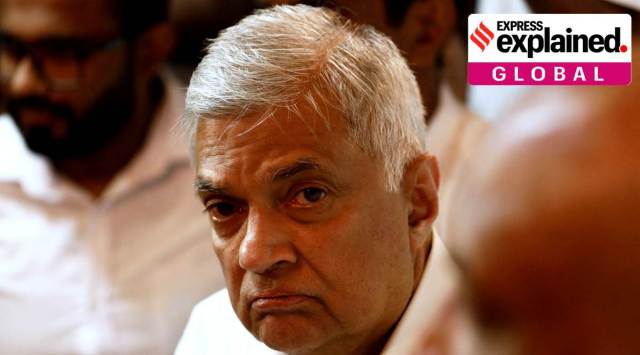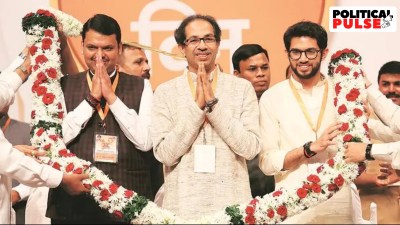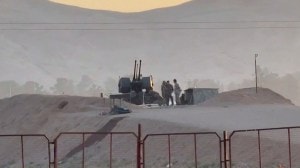- India
- International
Explained: What’s the 21st Constitutional Amendment aimed to cut power of Sri Lankan presidents
The amendment is likely to reduce the Presidency to a ceremonial position, retaining the powers of the President on all three armed forces while handing over almost all other key powers pertaining to governance, and cabinet ministers to the Prime Minister.
 Ranil Wickremesinghe, newly appointed prime minister, arrives at a Buddhist temple after his swearing-in ceremony amid the country's economic crisis, in Colombo, Sri Lanka, May 12, 2022. (Photo: REUTERS/Dinuka Liyanawatte/File Photo)
Ranil Wickremesinghe, newly appointed prime minister, arrives at a Buddhist temple after his swearing-in ceremony amid the country's economic crisis, in Colombo, Sri Lanka, May 12, 2022. (Photo: REUTERS/Dinuka Liyanawatte/File Photo)Sri Lanka’s new Prime Minister Ranil Wickremesinghe has said that the 21st Amendment to the Constitution to curb the presidential powers will be discussed with the Attorney General’s Department on Monday so that it can be submitted to the Cabinet for approval. The 21st Amendment is expected to annul the 20th Amendment, which gave unfettered powers to President Gotabaya Rajapaksa after abolishing the 19th Amendment, a provision that had made the Parliament powerful over the president.
What will the 21st Amendment entail?
The amendment is likely to reduce the Presidency to a ceremonial position, retaining the powers of the President on all three armed forces while handing over almost all other key powers pertaining to governance, and cabinet ministers to the Prime Minister.
There are two proposed amendments in the form of Private Member’s Bills – one by Samagi Jana Balawegaya (SJB) and another by Sri Lanka Podujana Peramuna (SLPP) MPs. Both Bills look at transferring powers of making key appointments from the President to the Constitutional Council. Both proposals agree that the Council should comprise of both MPs and citizens not affiliated to political parties.
Additionally, the President would require to act on the Prime Minister’s advice to determine the scope and functions of ministries and appoint ministers, deputy ministers and state ministers.
The two proposals, however, differ on the sway the President will hold over the Parliament. According to the SJB proposal, the President will be elected by the Parliament for a term of five years and can be removed by a no-confidence vote. The President will also lose the power of dissolving a Parliament session at will. The second proposal, on the other hand, allows the President to dissolve or prorogue the Parliament at any time after 2.5 years of its first sitting.

The proposal by SJB also calls for the establishment of a National Security Council to formulate policy and monitor implementation of policy relating the national security. The Council will be chaired by the Prime Minister.
Additionally, the Bill proposes amending Article 70 to allow the parliament to pass resolutions by majority vote to dissolve the parliament before its term expires.
Which amendments preceded the 21st Amendment?
The enactment of the 19th Amendment in April 2015 was rushed by then Prime Minister Ranil Wickremesinghe. It had removed the powers of the President to sack the Prime Minister at his discretion. Articles 46 (2) and 48 of the Sri Lankan constitution were amended ensuring that the cabinet ministers could have been dismissed only if the Prime Minister ceased to hold office by death, resignation or otherwise, or only if the Parliament rejects a statement of government policy or the budget or if the parliament passes a vote of no confidence against the Government. The amendment also restricted the President’s powers to dismiss Cabinet ministers as he was required to act on the advice of the Prime Minister.
This was overturned in 2019, when the Rajapaksa family came into power with Gotabaya Rajapaksa winning the presidential election and his brother Mahinda Rajapaksa occupying the prime minister’s office. The 19th amendment was scrapped.
After registering a landslide victory in the 2020 general elections, the Rajapaksas increased the executive powers of a President by bringing in the 20th Amendment. The amendment also empowered the President to make key appointments to independent institutions. It was after the passage of this amendment that close family members of the Rajapaksa brothers were installed in key positions.
A look at the proposed amendment’s timing
The proposed amendment comes at the time Sri Lanka is facing its worst economic and political crisis since it was liberated from British rule in 1948. A crippling shortage of foreign reserves has led to long queues for fuel, cooking gas and other essentials while power cuts and soaring food prices heaped misery on the people.
Protestors stationed outside the secretariat in Colombo and across the island nation have been demanding President Gotabaya Rajapaksa’s resignation, while his brother Mahinda Rajapaksa resigned as Prime Minister after violent clashes last week that left nine dead and hundreds injured.
Newsletter | Click to get the day’s best explainers in your inbox
Amid growing resentment, the President sacked his Cabinet and appointed a younger Cabinet. The 73-year-old United National Party (UNP) leader, Ranil Wickremesinghe, was appointed the new Prime Minister.
Discussion of an amendment also comes as a hope for bringing calm to the country, where the leaders are reaching out across party lines to resolve the prevailing crisis. Wickremesinghe has also invited the Leaders of the 10 parties that quit the previous government to discuss the current political situation and said he will make an appointment after meeting them.
Rajapaksa’s Sri Lanka Podujana Peramuna Party (SLPP) has extended their support to Wickremesinghe and almost all parties represented in the 225-member Parliament have said although they wouldn’t be a party to Wickremesinghe’s government they would support him in his effort to pull Sri Lanka out of the current economic crisis. Sri Lanka Freedom Party (SLFP) chief and former President Maithripala Sirisena has written a letter to Wickremesinghe, saying that his party will support the formation of his government.
The amendment will look to resolve the governance crisis in the country, where resentment against the President rises but executive presidency proves a major hurdle in removing the president and dissolving the parliament.
More Explained
EXPRESS OPINION
Apr 20: Latest News
- 01
- 02
- 03
- 04
- 05








































